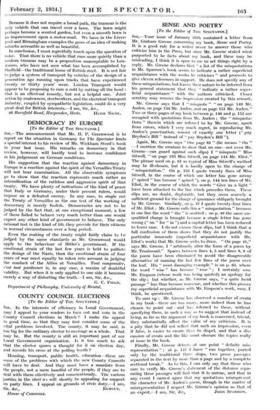DEMOCRACY IN EUROPE [To the Editor of THE SPECTATOR.] SI11,---The
announcement that Mr. H. P. Greenwood is to report on the situation in Germany for The Spectator lends a special interest to his review of Mr. Wickham Steed's book in your last issue. His remarks on democracy in that review, however, will hardly tend to increase confidence in his judgement on German conditions.
His suggestion that the reaction against democracy in Europe is a reaction against the spirit of the Versailles Treaty will not bear examination. All the observable symptoms go to show that the reaction represents much rather an intensification of the ruthless and aggressive spirit of that treaty. We have plenty of indications of the kind of peace that Italy or Germany, under their present rulers, would impose on a defeated enemy. In any case, to single out the Treaty of Versailles as the one test of the working of democracy is merely foolish. Democracies are not to be judged by the fact that, at one exceptional moment, a few of them failed to behave very Much better than one would expect any other kind of government to behave. The only rational test is the kind of life they provide for their citizens in normal circumstances over a long period.
Even the making of the treaty might fairly claim to Le judged by the same standards as Mr. Greenwood would apply to the behaviour of Hitler's government. If the emotional strain of the last few years is held to palliate the doings of the -Nazis, then the emotional strain of four years of war must equally be taken into account in judging the conduct of the Allies at Versailles. Tout comprendre, c'est tout pardonner is, in any case, a maxim of doubtful validity. But when it is only applied to one side it becomes merely a way of distorting the truth.—! am, Sir, &c.,








































 Previous page
Previous page